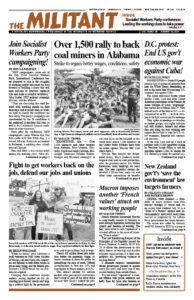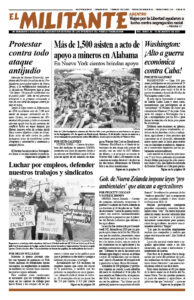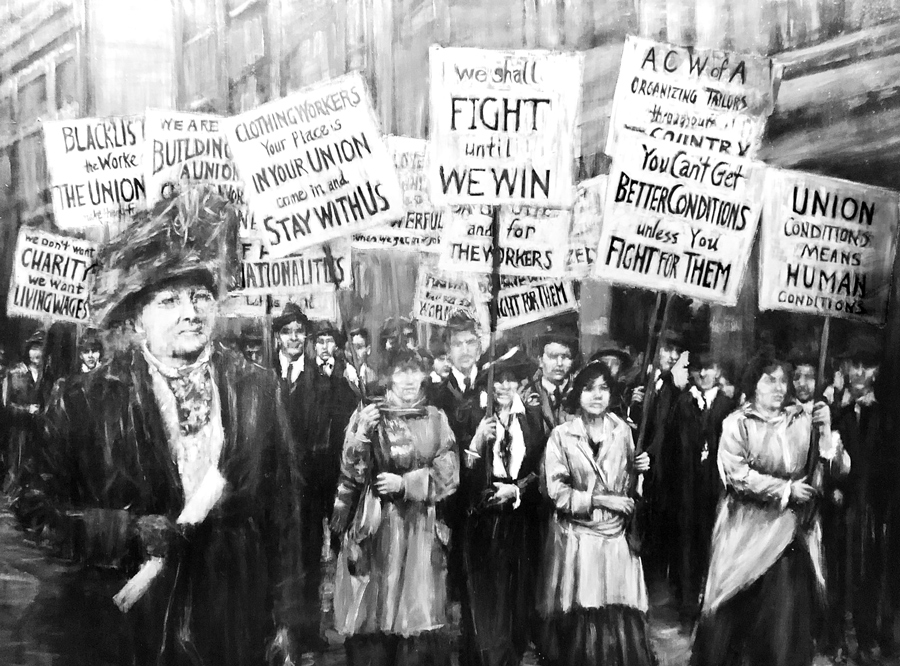One of Pathfinder’s Books of the Month for August is Mother Jones Speaks: Speeches and Writings of a Working-Class Fighter. From the end of the Civil War until her death in 1930 at age 100, Mary Harris “Mother” Jones tirelessly joined workers’ battles — coal miners in West Virginia, garment workers in New York, steelworkers in Chicago, streetcar workers in Texas and countless others. She was targeted and attacked by the bosses, cops and courts, and often jailed. A prosecutor in West Virginia called her “the most dangerous woman in America.” The speech excerpted here, “We Must Stand Together,” was given to a miners’ meeting in Louisville, Colorado, on Nov. 21, 1903. The introduction to the speech was prepared by Philip S. Foner, who edited the book. Copyright © 1983. Reprinted by permission of Pathfinder Press.
Of the 11,000 coal miners in Colorado only about 15 percent were organized, and the UMW launched a renewed organizing campaign in the spring of 1903. Most of the union’s members were in the northern field, mainly in Boulder County, while Huerfano and Las Animas Counties, in the southern and more productive field, were almost entirely unorganized. … All of the coal fields — almost a half million acres — were owned by two companies: the Colorado Fuel and Iron Company (CF&I) under John D. Rockefeller and the Victor-American Company under Jay Gould.
Colorado miners had good reason to strike. They lived in company-owned houses rarely better than crumbling one-room shacks with bare dirt floors and broken windows and they could be evicted at any moment’s notice if they dared protest. They were forced to buy at the company stores where, as in West Virginia, the highest prices in the district were charged. Their wages, moreover, were paid in script, not cash, so they had no choice but to buy everything they needed from the company stores. In addition, the coal they dug, on the basis of which they were paid, was weighed at the end of each day by company weighmen who invariably short-changed the miners. The miners themselves had no right to check the measurement. …
The strike covered the entire state. Not a single ton of coal was dug, and the people, feeling the lack of coal in a cold November, put pressure on the operators to settle. By November 15, the operators yielded but only in a way that divided the northern and southern strikers. The offer was for a 15 percent wage increase and an eight-hour day — but only for the northern miners. [United Mine Workers] President Mitchell and his supporters urged acceptance of the offer, and the northern miners met in Louisville to vote on the proposed agreement. Enraged to learn of the impending betrayal of the southern strikers, Mother Jones, accompanied by William Howells, president of UMW District 15, left for Louisville to recommend rejecting the proposed settlement. …
Mother Jones’s speech was brief and to the point. Realizing that the operators and Colorado Governor Peabody had spread propaganda against the Italians, who constituted a majority of the miners in the south, and had tried to get the northern miners, who were mainly American-born, to look down upon the Italians “with disdain,” Mother Jones began her speech with a plea for solidarity regardless of language or nationality.
The enemy seeks to conquer by dividing your ranks, by making distinctions between North and South, between American and foreign. You are all miners, fighting a common cause, a common master. The iron heel feels the same to all flesh. Hunger and suffering and the cause of your children bind more closely than a common tongue. I am accused of helping the Western Federation of Miners, as if that were a crime, by one of the National board members. I plead guilty. I know of no East or West, North nor South when it comes to my class fighting the battle for justice. If it is my fortune to live to see the industrial chain broken from every workingman’s child in America, and if then there is one black child in Africa in bondage, there I shall go.
I don’t know what you will do, but I know very well what I would do if I were in one of your places. I would stand or fall with this question of eight hours for every worker in every mine in Colorado. I would say we will all go to glory together or we will die and go down together. We must stand together; if we don’t there will be no victory for any of us.
I know that President Mitchell has sent a telegram to this meeting endorsing a settlement, but John Mitchell is in Boston, we are here in the field. A general cannot give orders unless he is in the field; unless he is at the battleground. Could a general in Washington give order to an army in Colorado? I know, too, that there are those in our union who would have us do nothing to help our brothers in the Western Federation of Miners now engaged in a life and death struggle with monopoly capitalists at Cripple Creek. I want the world to know, and all the papers to print, that I am going to Cripple Creek to speak there tomorrow for the Western Federation of Miners. I am not afraid to be classed as a friend of this organization and all criticism of me on that account falls flat upon my ears.
Goodbye, boys. I shall leave a happy woman if I know that you have decided to stand by our suffering brothers in the South. I will see you again, boys, after I have licked the CF&I. [The northern miners voted 228 to 165 to stay on strike.]


